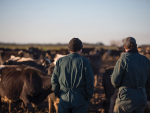Succession is often a difficult journey for farming families; the idea of ‘sharing the helm’ or seeing a change in captain can be challenging for many farmers, says an agricultural lender.
Rabobank’s latest report, ‘Farm Succession Planning: Navigating the seas of change’, highlights the importance of starting the process early to adequately map out a strategy and manage the expectations of all parties involved.
Commodity analyst and report co-author Emma Higgins says that honest conversations regarding profitability, expectations and visions for both the family and business pose as challenges when it comes to approaching succession.
“For existing farmers, the idea of initiating these discussions and handing over the helm can sometimes be overwhelming and complex – many are leaving it too late which can cause more significant issues to arise later on,” says Higgins.
“Simply delaying succession conversations and ‘hoping for the best’ is an incredibly risky strategy for the business and family unit. Delay in itself becomes a problem in that the more time passes, the more succession options become restricted, further exacerbating stresses and difficulties in the family.”
The Rabobank report suggests that building and maintaining a viable business and understanding the financial reality of the family farm is critical.
The company’s succession manager Tony Hammington says that seasonality ups and downs need to be considered, with both short-term and long-term needs assessed.
“A robust balance sheet and adequate cash flow are required to ensure career, work opportunities and retirement goals can coexist and meet the needs of all financially reliant on the business, before any new family members are offered the opportunity to work in the business,” he says.
“Conversations around profitability can be off-putting and further complicated by the strong emotional ties that accompany the sometimes judgmental opinions that a generation’s efforts are subjected to.”
Hammington suggests implementing planned business strategies that open up pathways for the next generation – such as share farming, leasing arrangements, family loans or equity partnerships.
“Having ‘skin in the game’ demonstrates commitment and generates additional motivation for new farmers, along with creating new options to expand the business,” he says.
“In addition, a win-win situation can arise for both parties – creating a role for the next generation in the family business can bring about a sense of achievement. A sense of value for the current generation is retained, and it provides the legacy of the family farm to the next generation.”










